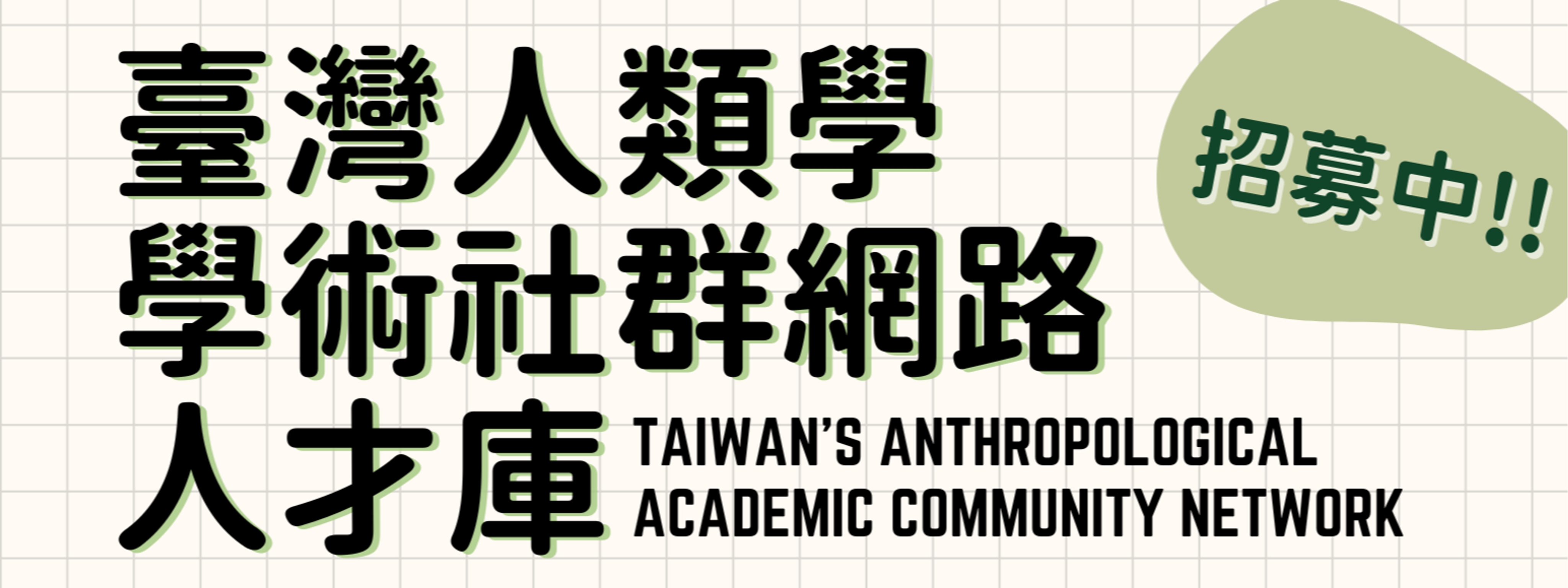國科會人類學與族群研究學門推動規劃補助計畫
專頁簡介
國科會人類學與族群研究學門(含原住民研究、客家研究、考古學、語言學、宗教學、博物館學、文化資產研究、文化研究等)長年支持各種學門相關專題研究、專書書寫及學術交流,而「接軌世界的臺灣人類學:人才培育暨研究寫作」作為一個推動規劃計畫,有以下3個聚焦點:
1) 吸引更多人才加入學門成員社群,互相分享全球人類學相關資訊(含機構資源、研究合作、補助方法等);
2) 長遠協助受臺灣培育的青年人類學者(或具備人類學背景的學者)走向世界;
3) 吸引國際青年學者投身臺灣人類學研究及專業交流。
何謂世界人類學?
「接軌世界的臺灣��人類學」是以World Anthropologies為概念,致力建構友善的學術環境使學者能夠接觸並運用多元的全球化專業資源,打破英、美、法系國家對人類學理論與方法的主導地位。這推動方案源自世界性學術組織的組成變化所啟發:
1) 相對以美國學者為主導的 American Anthropological Association, World Anthropological Union(WAC)等象徵強調去殖民、提供多元人類學價值可能性的學術網絡正在形成更強大的力量。2024年11月 WAC 舉辦的研討會,主題為「重新想像人類學知識」 (Reimagining Anthropological Knowledge: Perspectives, Practices, and Power)。
2) 在考古學界,相對於美國為首的 Society for American Archaeology,近年出現的 World Archaeology Congress,與上述的 WAC 的功能類似,成員地理分佈更廣;但稍有不同的是,主要幹部仍是以英國學者,或在英國受教育的學者為主。縱然有組織的多樣化。
問識意識
各國的學術人員培育及職涯發展要求更趨向以英文論文的產出為主,使學界深切反思當中隱藏的危機。當代人類學及考古學價值是什麼?是要對社會現象作出干預,還是以學術論文出版為主要目標?兩者是水火不容,還是能兩者兼得?
針對臺灣目前的局勢,人類學者是否也能有多元的學術發展路徑,無論在學術產出及社會參與上,都能把經驗貢獻給世界人類學界?臺灣學界能否建立一個支援系統,讓青年學者受培育時,同時適應目前的學術要求時,也維持對社會 制度的人文關懷、創新學科價值,並參與臺灣與世界人類學長期對話?
如何接軌?
本計畫旨在協助學門營造更友善的學術環境,讓成員認識接軌世界的專業資源,打破英、美、法語系對世界人類學理論及方法學話語權上的壟斷,提升學術對話的去殖民化及多元化。
本計畫也推動臺灣與世界人類學的各種互動和接軌。從跨國田野到組織對話,都值得由學門發動進行更多串連及提供更佳的學術基礎。藉由推動學術對話的去殖民化與多元化,我們希望促進臺灣學者與其他人類學傳統或新興學派之間的緊密互動,從而建立強大的專業人脈網絡與學術基礎設施。
推動方式:軟性基礎設施
本計畫為期兩年,將提供兩項關鍵的軟性基礎設施:
1) 招募學者建立「臺灣人類學學術社群網絡」,大家互通各地社群及機構資源消息,互惠合作
2) 舉辦邀請學者參與寫作營,旨在共同撰寫一篇回顧型研究紀要,分析東亞、東南亞、太平洋群島及中南美洲人類學的專業發展現況,並比較各地人類學價值的展現方式,最終產出一份集體創作的具體成果。
未來,我們將進一步提出一個為期三年的增能計畫,為學門成員提供實質支持系統,持續探討並實踐臺灣人類學界與全球學術界建立中長期對話的可能形式。
2025年社群活動
1月22日(已完成):「開啟與世界人類學的對話」實體寫作工作坊(嘉賓:American Anthropologist Prof. Elizabeth Chin,報名制)
5月:人才庫成員線上工作坊:東亞田野 (待定,邀請制)
7月:人才庫成員線上工作坊:東南亞田野 (待定,邀請制)
8月25-6日或9月5-6日:實體寫作營 (地點:臺東縣,邀請制)
8月27或9月7日:實體寫作工作坊 (地點:臺東縣,邀請制)
計畫摘要
本計畫針對人類學門之現況與未來進行補強工作,期望有意或已有一定程度與世界 人類學接觸的學門成員(尤其青年學者)得到兩項軟性基礎設施「臺灣人類學學術 社群網絡」資料庫及寫作營的支持,與世界人類學界產生長期學術對話,共同創��造 人類學價值。本計畫營造更友善的學術環境,讓學門成員認識各種接軌世界的專業 資源,打破英、美、法語系對世界人類學理論及方法學話語權上的壟斷。透過學術 對話上的去殖民化及多元化,本計畫讓學門成員培育工作更能與其他人類學傳統或 新興學派建立更緊密的互動關係。建立專業人脈及基礎設施。具體學術產出預計為 一項集體創作,由建立中的「臺灣人類學學術社群網絡」中找到合適人選,在寫作 營隊合作書寫回顧型研究紀要,闡述東亞、東南亞、太平洋群島以及中南美洲人類學專業發展近況、比較各地人類學價值體現方式。藉此,本計畫再提出三年期增能計畫,提供具實際效用的學門支援系統,持續討論及實踐臺灣人類學界與全球學術 界建立中、長期對話的形式,朝具社會實作、溝通價值的臺灣人類學多元學術工作方式前進,為身處各地的臺灣青年人類學學者建立富有互助精神的學術網絡,為有意到臺灣發展的國際學者,在接觸臺灣人類學界時找到支持力量或窗口。
(本計畫由國科會人類學及族群研究學門補助,計畫號碼:113-2420-H-143 -007 -MY2)
To strengthen the current state and future development of anthropology, this project, Towards Global Anthropology: Enhancement Program on Talent Development and Research Writing (Project No.: 113-2420-H-143 -007 -MY2), sponsored by the Discipline of Anthropology and Ethnic Studies under National Science & Technology Council, R.O.C. (Taiwan), seeks to build a supportive academic environment that enables scholars to access and utilize diverse global resources. We are committed to breaking the dominance of Anglo- and Franco-spheres in anthropological theories and methodologies.
By decolonizing and diversifying academic dialogues, we aim to facilitate close interactions between Taiwanese scholars and other anthropological traditions or emerging schools, thereby building a robust professional network and academic infrastructure.
This project will provide two key soft infrastructures: First, we will recruit scholars to establish “Taiwan’s Anthropological Academic Community Network” to exchange information regarding academic updates and institutional resources. Second, we will invite scholars to participate in writing workshops, aiming to draft a review paper collaboratively. This paper will analyze the current developments in anthropology across East Asia, Southeast Asia, the Pacific Islands, and Central and South America, and compare how the values of anthropology are showcased in different regions, ultimately producing a collective creative output.
In the future, we will propose a three-year capacity-building plan to provide tangible support systems for members of the discipline, continuously exploring and implementing possible forms of medium- to long-term dialogues between Taiwan’s anthropological community and the global academic community.
Project Summary:
This project strengthens anthropology as an NSTC’s academic discipline by establishing an expert database of “Taiwanese anthropology professional network” and a writing boot camp for the members (particularly junior scholars). The two types of soft infrastructure are designated for facilitating Taiwanese anthropologists’ dialogues with world anthropologies to co-produce anthropological values. This project creates a friendly academia network that connects the members to global professional resources. It helps to decolonize and pluralize the discourses of anthropological theories and methodologies that were monopolized by Anglophone and Francophone institutions. This project fosters talent nurturing as more interactive with the other anthropological traditions or groups. The major academic outcome will be a collective writing of academic journal’s review paper regarding the development of anthropology and the value creation of anthropology in East Asia, Southeast Asia, the Pacific Islands, and Latin America. Based on this project, the team aims to propose an advanced level of project to establish a long-lasting supporting system for anthropologist engaged in Taiwan anthropology. The team assists the members to continue their dialogues with world anthropologies and pursue pluralized anthropological values of which Taiwan recognizes. This supportive network will be important to the interactions between Taiwanese junior anthropologists and world anthropologists interested in Taiwan.

